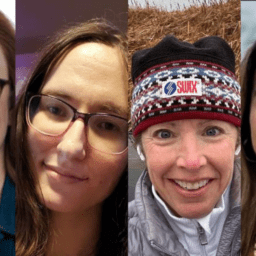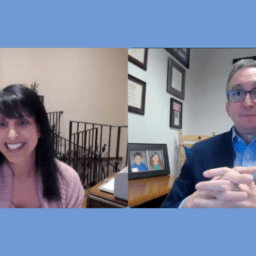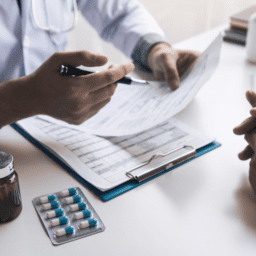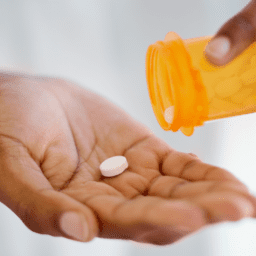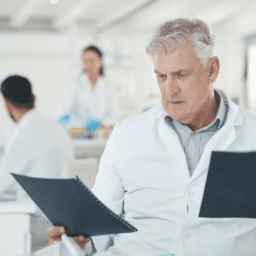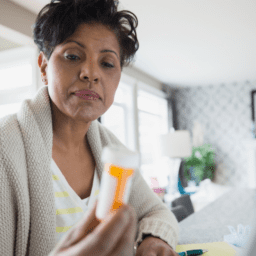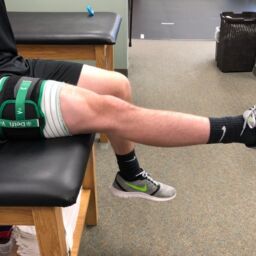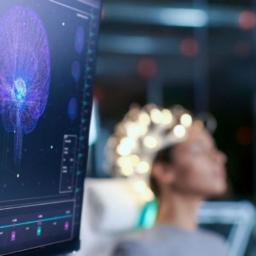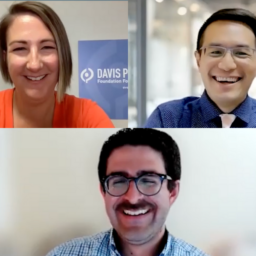In this video, Dr. Annelien Oosterbaan discusses the distinct effects young onset Parkinson’s has on the lives of women.
You can read the transcript below or you can download it here.
Note: This is not a flawless, word-for-word transcript, but it’s close.
Melani Dizon (Director of Education and Content, Davis Phinney Foundation):
Hello and welcome everybody. My name is Melani Dizon. I’m the Director of Education and Content at the Davis Phinney Foundation, and I’m here today with Dr. Oosterbaan. How are you doing?
Dr. Annelien Oosterbaan (MD/Ph.D., senior researcher project ‘Women and Parkinson’s’, former gynecologist, PWP, Park-influencer):
Thank you. Thank you. I’m doing well.
Melani Dizon:
Great to have you here. And where are you? Let’s tell everybody where you’re calling in from.
Dr. Annelien Oosterbaan:
Well, I’m in Rotterdam, the Netherlands, So, in, yeah, it’s a great town. Melani Dizon:
Yeah. I think it sounds fabulous. Okay. So, can you tell us a little bit about yourself, your work, your family life, sort of the big picture, and then we’ll get into all the other juicy stuff
Dr. Annelien Oosterbaan:
Yes. With pleasure. Well, So, thank you for inviting me today to share both my personal and professional story. So, my name is Annelien and I’m 40 years old and a proud mother of four kids. I work as a medical doctor for like four days a week and dedicate the rest of my time to my research project on women and Parkinson’s Disease. I got diagnosed with Parkinson’s Disease about seven years ago, and I think it’s the combination of my, it’s the combination of my background in gynecology together with my own personal experience that has made me, yeah, realize that I was like, kind of called to do this research and be an advocate for young women with Parkinson’s disease. Yeah.
Yeah. So, first of all, how old are your kids? Dr. Annelien Oosterbaan:
The oldest one is 11. That’s Fiona. It’s a girl, and then they’re two boys at 10 and seven, and the youngest one is- She’s just turned one.
Melani Dizon:
Okay.
Dr. Annelien Oosterbaan:
Yeah.
Melani Dizon:
Oh, that sounds fabulous. you, that’s busy, I mean, that alone is busy. So, you must be just filled up every minute of the day.
Dr. Annelien Oosterbaan:
Yes, yes, that’s true. Melani Dizon:
You like it that way.
Dr. Annelien Oosterbaan:
I’ve been really efficient, but I manage, and I like it. I really like it a lot. Yes. They give So, much energy, so, yeah.
Melani Dizon:
Yeah. Yeah. That’s great. Okay, So, can we talk a little bit about your diagnosis? Like, what prompted you to look into it? What happened first and what was your process like in terms of getting that official diagnosis, the care you got, all that kind of stuff?
Dr. Annelien Oosterbaan:
Well, it only took me like three months from initial science to diagnosis, and I that it’s, I think it’s due to my profession because I did a lot of surgery and it started with a frozen shoulder, and that really interfered with my job. So, I was really keen on looking, yeah. Diving into it. And I had some rigidity also in my lower left, lower arm, and I believe, yeah, it was, I think it’s just a combination of a medical background and my determination to find the immediate answer that ate my diagnosis So, timely, but also, therefore, it was kind of a shocker that it came. So, yeah. In like, in such a short note period, I got this terrible diagnosis that I really didn’t expect.
Melani Dizon:
Yeah. And you, so, it sounds like, I mean, you don’t have that sort of look back where people say, oh, I had experienced symptoms for a really long time. Yours were very sort of motor- related and just kind of came on quickly.
Dr. Annelien Oosterbaan:
Yeah. And then I just, I visited, I eventually got this diagnosis, Parkinson’s disease, but after I visited a physiotherapist, I didn’t have any symptoms at all for, for a while. So, I really didn’t feel sick at all. But still, I had this diagnosis and had to deal with it. And of course, I was shocked to hear these life-changing words. You have Parkinson’s, and, but really from day one, I felt strong and ready to fight. And well, up till today, I’m literally fighting back because I practice boxing and that’s a really nice thing to do. And I exercise at least like five times a week because I consider exercise as the most important form of therapy. And last month I even ran the Roam Marathon, a complete marathon for the second time. Excellent. So, that was really cool. Yeah. Nice.
Melani Dizon:
Congrats. That’s great.
Dr. Annelien Oosterbaan:
Thank you.
Melani Dizon:
Did you, So, when you got the diagnosis, did you start medication right away?
Dr. Annelien Oosterbaan:
Not immediately. Only after, I think after one and a half years. Okay. And it was just last time that I went to the pharmacist that I was kind of shocked that she got me like a shopper full of boxes, and I thought I was really like, okay is it for, is it for a year or so? Or, and then she said, no, it’s only for three months. And then I was, okay, this, So, the disease is progressing because, you know, I tend to work out a lot and I’m almost symptom-free all day, but still, the first time I started medication it was like one tablet a day, and now it’s like a lot.
So, a lot it
Dr. Annelien Oosterbaan:
Was kind of confronting. Yeah.
Melani Dizon:
Yeah. Yeah. And you say you work out five times a week, you do boxing, you run. What are some other things that you do?
Dr. Annelien Oosterbaan:
I also play field hockey at a quite high level still. And I play golf. And yeah, actually, and I do bike. I race, bike racing. Yeah, I, and I just love all sports with the balls,
Melani Dizon:
So oh, nice. You do it all the ball. Is there, is there anything that’s impacted or are you just like, nah, no, I’m feeling, feeling good.
Dr. Annelien Oosterbaan:
No, I feel quite good, actually. Even with the heavy duration and like the marathon running and the heavy boxing, I think and heavy lifting, it’s, it gives me So, much mental power also, and keeping my strength and using my whole body. I think it also really helps with your coordination and forcing me to use my Parkinson’s size always the way I, yeah. Describe it. It’s mostly because I’m most impacted on my left side, and I tend not to use this arm, but since I box and I keep challenging myself also, like, and things in the house. I use screwdrivers with my left hand or yeah, brush my teeth with my left hand. I, since I do that on purpose, I notice that it helps and I use it in spontaneous ways also more often, so, yeah. Yeah.
Melani Dizon:
Of those early days, like you had three little, little kids, right? When you were diagnosed. because you’re seven years when your third one is seven, right? Yeah. What was that like? And how did you, or have you told the kids and, you know, what was that whole experience? Yeah,
Dr. Annelien Oosterbaan:
It was difficult in the beginning. I didn’t tell them because as I said, I didn’t have that much, that many symptoms, and I just, yeah. Lived a normal life. And I really didn’t feel sick. I still don’t actually, but I live with it, but I don’t feel sick. But yes, of course, sometimes my symptoms can be annoying, and they can interfere with being, feeling like a complete mother. Like having to switch diapers with a baby, turning over and over, and rounds and rounds. It’s quiet, it’s for a normal mother also already a challenge. But for me, it’s really challenging. So, the most important thing is to stay calm. And I think I still am able to live a normal life, but I think it’s also due to the fact that we apply lots of humor to situations. Like, it just helps sometimes to just poke, poke fun at yourself, or laugh about silly symptoms and look at the lighter side instead of yeah. Making it feel heavy or, yeah.
Melani Dizon:
So, before your fourth child, you said that you did a lot of research on how pregnancy might impact your symptoms and progression. So, what did you learn, and how much of that turned out to be true or false, or what surprised you the most while, you know, being pregnant while having Parkinson’s that fourth time?
Dr. Annelien Oosterbaan:
Well, actually, the most important thing I learned was that there’s a really gigantic research gap around women and Parkinson’s disease. And this is this definitely accounts also for pregnancy and Parkinson’s. And we all know that women have been neglected in medicine for a long time and treated like men. But we are just, we are not small men and men don’t get pregnant.
Melani Dizon:
Men. I love that.
Dr. Annelien Oosterbaan:
No, we’re just, we’re not just small men and men don’t get pregnant. So, my search just left me without proper answers. And it was said, like, the only thing I found was because I was really concerned about disease progression already having three kids to take care of. It was said that 50% of women would show disease progression, but it was unclear why and how, and did it recover? Did this woman take medication or didn’t they this was not described, So, it was like not finding any answers, made the decision to have another baby, really a difficult one, and even anxious one for me. And yeah, I was afraid not to be able to take care of the baby yeah, in case you deteriorate too much, but still, we decided to go for it because yeah,
Melani Dizon:
Sort of the lack of evidence, beautiful lack of evidence. Give you a little bit more, Dr. Annelien Oosterbaan:
I kind of let my physiotherapist convince me a little bit because I just ran a marathon before the last baby, and also yeah, four years ago. And she said, well, you can run a marathon So, you can also be pregnant again because you’ll manage. And I thought, oh, that sounds quite like that makes sense. So, Yeah, she, she tries, she kind of convinced me that I could do it, but it was kind of scary. And it, even in the course of pregnancy disease did pro progress. I really got more symptoms, more tremors, and my dis- my medication had to be doubled, like the, like, from four times a day to eight times a day. And that did that,
Melani Dizon:
Did that feel, did you feel the increase in symptoms quite early on in your pregnancy, or was that a while in, or
Dr. Annelien Oosterbaan:
Later and in the beginning, I, yeah, I was vomiting a lot, So, that didn’t help because yeah, you just don’t take up the medication. So, that was a real challenge, but that was a problem in all my pregnancies is that wasn’t new. But then from a week of 26 or and onwards, I think when the belly was really growing, I just didn’t manage to sleep well. And I think, yeah, all from, from the moment I had Parkinson’s disease, I noticed that it’s not sleeping well for having poor nights of sleep is really impactful on your symptoms. So, I think looking back, the progression in pregnancy was really due to feeling very fatigued and yeah, poor nights of sleep. And when Josephine was born, she was immediately really a well-sleeping baby. So, I slept the first night, it was So, great to sleep a whole night. And also, I’m a belly sleeper, So, I got to turn on my belly, and huh. And the next morning I really felt So, relieved, and already I could have my dosage again. It was really like a miracle.
Melani Dizon:
Oh, wow. That’s a good turnaround. That’s the sign of somebody very healthy going into pregnancy. Was there anything else that you changed medication-wise or activity-wise during your pregnancy?
Dr. Annelien Oosterbaan:
Yeah, before pregnancy, I had to change my medication, and that’s just I think yeah, I had to do it because of a lack of evidence. The only medicine that seems to be safe is Levodopa monotherapy. So, and I was using Primary Pol, it’s yeah, don’t think any. So, I had to stop, and it was quite difficult because I already was using a high dosage, So, I had to have real skiing to lower and lower that, and then increase the levodopa to find a new balance. So, I think it took me like two to three months to get a new stable situation before I got to become pregnant. And then the levodopa was, was, yeah, already from the beginning wasn’t really enough. I think with the agonist, I had this like, really, this constant working tablet, constantly working tablet all day long, and the levodopa is more like fluctuating. So, that annoyed me a lot already from the beginning.
Melani Dizon:
Yeah, definitely. So, what are some of the notable research that’s out there on pregnancy and Parkinson’s? I mean, obviously, a gap exists, but what are some of the things that you feel confident now talking to people who want to get pregnant and have Parkinson’s? What are some things that you’re a little more clear on than others?
Dr. Annelien Oosterbaan:
Well, I think, and I know because I’ve been using So, much Levodopa, and there, that there are some nice refuses that summarize the data from the case reports that exist, that Levodopa is really a safe choice in pregnancy. And I would advise women not to stop their medication in case they really do need medication. I think, and I hope that we can find out in the future that dopamine agonist is also safe, and but for now, I would say there’s not enough significant evidence, but also around breastfeeding, it’s just, yeah, I think it would be safe to breastfeed probably, but we don’t know. And it’s, these are also things like many women in Africa for ins for instance, they do breastfeed and we, yeah, in as we can, as soon as we can get these data from these women and about their children, we can talk more about whether breastfeeding is safe. I, yeah, I hope to find out in the future.
Melani Dizon:
Do you mean with Levodopa, or do you mean the dopamine, I guess?
Dr. Annelien Oosterbaan:
Yeah, with levodopa at least. Okay. And then also the other types of medication. Yeah. Yeah.
Melani Dizon:
What else, what else, what other questions do you wish you had the answer to?
Dr. Annelien Oosterbaan:
Yeah, well, also management protocol. There are no guidelines, no management protocol. So, I was pregnant I was working in an academic medical center, an academic medical center with all, yeah, most knowledge. But around this topic we were like, it was a blank, So, we had to make a plan with them, yeah. It’s really, it was really difficult. So, we were just considering things for what can be an issue. Well, I visited an anesthesiologist because like medication for nausea or other things better not to prescribe to a person with Parkinson’s disease. So, we have been talking about that, and it just made me feel a little bit more safe to, even though we didn’t have answers to do, ask ourselves some questions and be prepared at least. Yeah. So, I think this is good to have a proper healthcare team around you when you, in case you consider pregnant people you, if you know, you feel safe with, and just have some knowledge at, at least about Parkinson’s disease. And yeah, the kinds of med medication that we that’s good for us.
Melani Dizon:
And so, you said that you did notice the progression? Did that stick with you after the baby was born? Did you feel like, oh, it was just like an increase in symptoms, but that sort of went away after, or did it feel like, wow, you kind of progressed a couple of years in those?
Dr. Annelien Oosterbaan:
No, that’s, So, I’m happy that didn’t happen because, at the end of pregnancy, I was really afraid. I thought if this is going to be the new status it really has progressed a lot then may, no, yeah, I was really, really anxious about that. But then after delivery, it really, I told, as I told you, the, after one night already, I felt much better. But then from two weeks after yes, the female was born, I started to work out already. It’s a little bit early, but I was really determined to become fit again. And I think I’m, I feel more physically, more fit than before pregnancy, actually at this moment.
Melani Dizon:
Wow.
Dr. Annelien Oosterbaan:
So, no. Yeah. And that’s also why I ran the marathon, or I wanted to do it this year again because I know when I have such an event in the future, I have to train a lot. And I know how well, how good it made me feel like four years ago. So, I just wanted to achieve that again, and yeah, I made, I made it, so, yeah.
Melani Dizon:
Yeah. So, what do you think that, well, what is your I don’t know how much you know about the medical system in the US or, but what do you think that movement, even movement disorder specialists sort of get wrong about women and pregnancy?
Dr. Annelien Oosterbaan:
Well, I think many, many doctors or healthcare providers around people with Parkinson’s are afraid of pregnancy a combination of pregnancy, and Parkinson’s disease, just because they don’t know.
Melani Dizon:
Do they tend to err on the side of like, Ooh, I don’t think you should get pregnant?
Dr. Annelien Oosterbaan:
Yeah, that’s what I hear. Like I’m on all these social media, like Facebook groups and all the, and I tend to hear yeah, some women speak about their doctor telling them not to become pregnant or advise them not to, or family members telling them not to, or the, but I think that’s really sad because a child wish is really a deep wish and it’s So, beautiful to have children. And I, yeah. Especially after my last experience. Yeah. I think we should not tell women they cannot have a baby with Parkinson’s disease and right. Of course, we need more data and more information in the future, but there’s also no evidence that it’s harmful. Of course, being a woman yourself, you need to feel confident, and yeah. I feel, yeah, it’s your own decision. But yeah, I hope really women in the future can make a more informed decision than United had to take.
Melani Dizon:
Yeah. I mean, it sounds like we could use some you know, extra training for movement disorder specialists around women and, and yes. Parkinson’s getting that fellowship or something, right?
Dr. Annelien Oosterbaan:
Yes. Yeah. I also did a survey in the Netherlands about the topic around among women between 2060 concerning all life stages and hormonal impact on the Parkinson’s symptoms. And I hope to get a paper out really soon about a concern, this topic, and also, yeah, add some things around women and Parkinson’s in the guidelines. Yeah. And we will, we will start with some expert opinions, and then we start, we will get this moving forward. Right. But there, yeah, there aren’t more and more researchers in the world doing yeah, working on this topic more and more. So, it’s yeah,
Melani Dizon:
It’s good. What about women in menopause, women with Parkinson’s around menopause? What have you found what’s happening in the research there?
Dr. Annelien Oosterbaan:
Yeah, that’s also a really difficult topic. Everything, it’s has been written up to today is really contradictory in that all the one study says the one thing, and the other says the other thing. Yeah, of course. Just thinking clearly. Logically you would say, of course, pure menopause, menopause is impactful for a woman. Everything that’s impactful on your physical condition. Like even having the flu impacts our Parkinson’s disease symptoms and the effectivity of our medication. This, of course, go through menopause is really impactful on your Parkinson’s disease, but what to do about it’s just not unknown, but I think that shouldn’t say that women should not ask the questions and they should ask their healthcare providers and tell them about their symptoms and these influences, and we should just learn from that. Even being heard or getting acknowledgment or hearing other women suffer from this too, that already helps, but I think maybe we should treat it with like hormonal replacement therapy instead of moral levodopa or things like that. But it has all has not been done yet. So, it’s really,
Melani Dizon:
Yeah. So, there’s no, there’s no, there’s no studies or evidence on it or- Dr. Annelien Oosterbaan:
No, no. Because there has hormone, no replacement therapy has been prescribed to women with Parkinson’s, but all in other stages of the pyramidal, all with different durations, all with different dosages. So, it, and there’s So, such small numbers, So, we need really international collaborations and clinical trials to test this out.
Melani Dizon:
Why is it So, hard to get this done?
Dr. Annelien Oosterbaan:
Yeah, because I think because we have to really neglect in clinical trials of, to trials up till today. And the topic of women’s issues in particular in whole, in the whole medical field is just from a couple of years ago, beginning to get under the attention of researchers. I know because they were all men or it’s really a men-dominated world, but now women stand up for themselves and I don’t know. It’s just we started a battle, and we are going to win.
Melani Dizon:
Yes. Did you have any experience or have had you, or have you had experience with people, women with pregnancy, and DBS?
Dr. Annelien Oosterbaan:
No, I don’t know women that underwent DBS and pregnancy as well. No, I don’t, no, I think it will happen much more in the future because DBS finally, also in the Netherlands can be done without or under general anesthetics because it was made women really afraid of the procedure. So, I think, and also with the increasing age, maternal age we, and the increase of the disease incidents, we will see much more in the future. Yeah. Yeah. We have to yeah, with the pregnancy registry, we can follow up these women. Yeah. Yeah.
Melani Dizon:
That’s a great segue. So, what is PregSpark?
Dr. Annelien Oosterbaan:
Yes.
Melani Dizon:
And how did you get involved with it?
Dr. Annelien Oosterbaan:
Yeah, So, PregSpark is the international registry for pregnancy and Parkinson’s Disease. It’s my baby. I wanted to finish it earlier, but I’ve been working on it for years now. Because of the ideas, the idea already started before when I was looking into literature and found there was nothing. But it’s a registry. All women around the world who become pregnant and have a PD diagnosis can enroll at our website pr park.com is from pregnancy and the spark of Parkinson’s, of course. And the website is almost finished. Women will receive questionnaires like every trimester of pregnancy and after delivery. We will gather information around their general health, PD diagnosis, medication use, pregnancy outcome of course, but also their well-being being anxious or not the physical activity, like all the things I wanted to know about but didn’t learn yet to learn.
And of course, it can be, the questionnaires will be extensive, So, we will not demand them to fill up every question. So, there will be obligatory questions, and some they can just leave open if they want. And pe women can enroll from the beginning of pregnancy up to eight-way eight weeks postpartum. So, if they only hear about PregSpark after delivery, it’s not a problem. But we will end inclusion at eight weeks postpartum. Because the most important data for me is still the data from pregnancy outcomes how yeah, the child, how is the child doing? And all the questions about their medication, they can tell me afterward as well. But I would most be most happy if women enroll at the beginning of pregnancy. Yeah, yeah, yeah. And follow-up will be up to one to two years postpartum, because they also want to know what I want to know, of course. How is the mother also doing one year or two years later, how’s the progression? Did it stay or what did she become? Yeah. In her old status again. And also, the children, how do they, because immediately after delivery, okay, they were fine, but how about later on? It’s also important for mothers too. Yeah. Our parents. Yeah.
Melani Dizon:
Yeah.
Dr. Annelien Oosterbaan:
That’s exciting not to learn. So, I wanted, it’ll be an ongoing continuous prospective registry and yeah, I’m really happy that we could make it happen. Yeah.
Melani Dizon:
Yeah. And then from there, hope to do, you know, like get some funding for clinical trials and that kind of thing. Yeah.
Dr. Annelien Oosterbaan:
Have this data, but it’s separate from the Brexit spark. It’s really only about the pregnancy. But of course, my women, MPD research line will try to collaborate internationally on clinical trials on that topic. But this is really only about pregnancy. And we want to eventually with the data, we will get, get management guidelines out there Yeah. And information for women really needs. Yeah.
Melani Dizon:
That’s great. Yeah. Is there anything that you want to talk about that I haven’t asked about?
Dr. Annelien Oosterbaan:
No, I don’t think so.
Melani Dizon:
Okay. I think we got it covered. Okay. Good. Well, the work you’re doing is So, important and like you said, there’s this isn’t going anywhere, So, there’s going to be a lot of women that are going through this and wondering, you know, getting diagnosed earlier and still wanting to have kids and yes. Great. That you’re you know, as an example, and also just pushing the research forward So, that down the line, people can feel even more comfortable.
Dr. Annelien Oosterbaan:
Continuing. Yeah. I just wished I could, I could help all these women. Sometimes I think I need like a video consulting online for women, maybe on PregSpark the website. I will create like some fi some just consulting moments for groups. Women just can, can enroll and just ask me questions because yeah. I’m one of them, yeah. I think it’s, there are not many gynecologists in the world that know something about pregnancy or women’s issues and also about Parkinson’s, just from also a doctor’s perspective, but also the patient’s perspective. And
Melani Dizon:
Then, yeah. And I mean, I would just think the, in any situation, like the fear, uncertainty, unknowns are like, it’s already huge, right? And yeah. Add to the fact that you don’t know if you’re doing something wrong to yourself or wrong to the baby, and that’s a really tough decision. So, yeah, that’s a really important thing. It would be great to have for people.
Dr. Annelien Oosterbaan:
And most people are like the partner or the family. Most people are worried about the baby. But I was really, maybe it’s selfish, but I was really worried about myself actually. Yeah. That was a topic that was really not spoken, we didn’t speak about it, but for me, it was like, yeah, but what about me? I don’t want to really progress that much and be physically incapable of taking care of my child and then have a healthy baby, but-
Melani Dizon:
Right, yeah. Yeah. And like you said, you are dealing with all of the other people in your life that have an opinion, don’t do it. We can’t do it. You want to do it, you shouldn’t do it, you should do it. Yeah.
Dr. Annelien Oosterbaan:
Yeah. People have lots of opinions. It’s also when you have a diagnosis like this, people also tend to feel like they can just spread their, their me, their, how to say it, what they think. Yeah. Yeah. On you too, well, I am just a mature woman, and I can make my own decisions. And they do the
Melani Dizon:
Same thing when you’re pregnant too, right? Like, when people get pregnant, even without Parkinson’s, they tell you all the things you should do and shouldn’t do.
Dr. Annelien Oosterbaan:
Yeah. No, we’re just all grownups and years. Yeah, yeah, yeah. So, we managed.
Melani Dizon:
Well, thank you So, much.
Dr. Annelien Oosterbaan:
I’m really happy. Happy. I did, I got pregnant because Josephine is really the happiest baby that I have, yeah. She’s always smiling. She’s like, really? My dopamine and my secret ex extra dopamine. He’ll, I take every day. Yeah.
Melani Dizon:
Aw, that’s sweet. Yeah. Polly and I are always looking at pictures of you and the babies and thrill. Yeah. So, that’s great.
Dr. Annelien Oosterbaan:
I’m So, happy. But the other kids are also So, nice. It is sweet to her help out and we just have So, much fun together. Yeah. Well, I hope it stays that way for a long time.
Melani Dizon:
Yeah. Well, thank you So, much for doing this today. I really appreciate it, and I know our community is going to appreciate it too, So, thank you. Okay.
Dr. Annelien Oosterbaan:
You’re welcome.
Notes
Dr. Annelien Oosterbaan had three children when she was diagnosed with young onset Parkinson’s. As she was considering having another child, she researched the impact of Parkinson’s on pregnancy and found that there was very little research on the subject.
For example, she found research that said that 50% of pregnant women with Parkinson’s experienced accelerated progression during pregnancy, but nothing about whether this progression was transient, why it occurred, or how it might be prevented. Moreover, the research she found did not even indicate whether the people referenced in the study were on medication.
This experience inspired Dr. Oosterbaan to develop PregSpark, a project that aims to collect data about the experience of pregnant women living with Parkinson’s.
Some consequences of the sex and gender gap in Parkinson’s research
- There is limited research regarding the risks related to pregnancy and Parkinson’s. For example, minimal data is available about the safety of Parkinson’s medication during pregnancy.
- Currently, levodopa mono-therapy is the only Parkinson’s treatment with safety data regarding use during pregnancy. Indications are that it is safe for use.
- Technically, breastfeeding cannot be recommended while taking Parkinson’s medication due to insufficient safety data; however, many women have breastfed without issue.
- There are no established medical management guidelines for people with Parkinson’s who are pregnant. This can be a significant issue when specialty care providers involved in pregnancy care, such as anesthesiologists, are unfamiliar with contraindications relative to Parkinson’s.
- There is contradictory evidence in the available research about the impact of menopause on Parkinson’s.
- Hormone replacement therapy has not been studied in people with Parkinson’s.
A selection of Dr. Oosterbaan’s personal observations and experience
- During her fourth pregnancy, Dr. Oosterbaan’s symptoms progressed significantly, but they returned to their pre-pregnancy severity after giving birth. She attributes this temporary worsening of symptoms to the fatigue of poor sleep, difficulties related to medication absorption, and the nausea and vomiting she experienced during pregnancy.
- Dr. Oosterbaan conducted a study on women with Parkinson’s in the Netherlands. The study involved women at all stages of life and considered hormonal influences on Parkinson’s symptoms. She hopes to publish the paper soon to help develop guidelines for treating women with Parkinson’s.
- Dr. Oosterbaan finds that even without sufficient data to inform her personal decisions, talking with other women with Parkinson’s who have experienced pregnancy has been helpful and informative to her.
Additional Resources
YOPD Women’s Council Resources
Parkinson’s in Women and Men: What’s the Difference?
WANT MORE PRACTICAL Resources LIKE THIS?
You can learn much more about living well with Parkinson’s today through our Every Victory Counts® suite of resources. Each manual is packed with up-to-date information about everything Parkinson’s. Click the link below to order your manual(s).
Thank you to our 2023 Peak Partners, Amneal and Kyowa Kirin, and our Every Victory Counts Gold Sponsor, AbbVie Grants, for their ongoing support of these must-have manuals. Additionally, we’d like to thank Barbara and Dale Ankenman, Abby and Ken Dawkins, Bonnie Gibbons, Gail Gitin in loving memory of Gene Gitin, Irwin Narter, and Lorraine and J Wilson for their generous donations that allow us to make these resources available and free to all.
About the Speaker
Dr. Annelien Oosterbaan
 Annelien is 40 years old and lives in Rotterdam, the Netherlands. She was diagnosed with Young Onset Parkinson’s Disease (YOPD) in 2016. Annelien is an active mother of four kids. She truly believes in the benefits of sports and exercises five times a week to keep her physical abilities at their best and boost her mental health and well-being. Last April, she ran a marathon in her hometown, her second since being diagnosed with Parkinson’s. The combination of being a young woman, a gynecologist, and living with YOPD herself made it feel like a calling to start her research project on Women and Parkinson’s at the Radboud University Medical Center in Nijmegen in 2021. Besides working as a doctor four days a week, she dedicates all her time to reaching her ultimate goal of closing the gender gap in Parkinson’s research and being able to impact the quality of care and of life of other young women with Parkinson’s. She is particularly interested in the cyclic patterns in Parkinson’s symptoms and in the impact and outcome of pregnancy in YOPD women. She is really happy to have realized the International Registry for Pregnancy and Parkinson’s: PregSpark.com to be able to study the effects of pregnancy on Parkinson’s and of Parkinson’s on pregnancy.
Annelien is 40 years old and lives in Rotterdam, the Netherlands. She was diagnosed with Young Onset Parkinson’s Disease (YOPD) in 2016. Annelien is an active mother of four kids. She truly believes in the benefits of sports and exercises five times a week to keep her physical abilities at their best and boost her mental health and well-being. Last April, she ran a marathon in her hometown, her second since being diagnosed with Parkinson’s. The combination of being a young woman, a gynecologist, and living with YOPD herself made it feel like a calling to start her research project on Women and Parkinson’s at the Radboud University Medical Center in Nijmegen in 2021. Besides working as a doctor four days a week, she dedicates all her time to reaching her ultimate goal of closing the gender gap in Parkinson’s research and being able to impact the quality of care and of life of other young women with Parkinson’s. She is particularly interested in the cyclic patterns in Parkinson’s symptoms and in the impact and outcome of pregnancy in YOPD women. She is really happy to have realized the International Registry for Pregnancy and Parkinson’s: PregSpark.com to be able to study the effects of pregnancy on Parkinson’s and of Parkinson’s on pregnancy.


